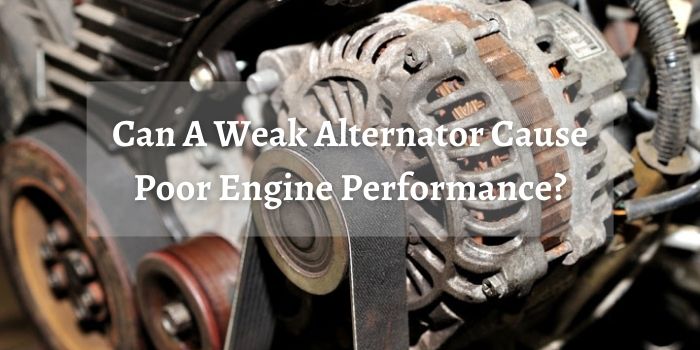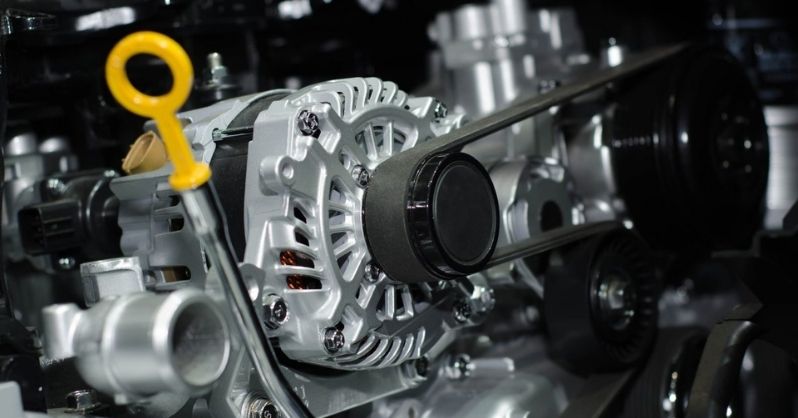Have you ever noticed your car isn’t performing as well as it usually does? You’re not alone. Many vehicle owners find that their cars just don’t have the same get-up and go they’re used to.
While there could be any number of reasons for this, a weak alternator is one possible culprit. If you’re asking, Can a weak alternator cause poor engine performance, you’re in the right place. In this article, we’ll discuss the causes, consequences, and potential solutions to a bad alternator. Stay tuned!

Can A Bad Alternator Affect Performance?
Yes, it can. It charges the battery and powers the electrical accessories while the engine is running.
So, a bad alternator can cause several problems, including dimming lights, slow engine start, and weird engine noises. In some cases, it can even cause the engine to stall.
However, a bad alternator will not necessarily affect the performance of the vehicle. The engine will still be able to run, but it may not be able to power all the electrical accessories.
As a result, it’s important to get the alternator checked if you notice any of these problems. Otherwise, you may end up being stranded with a dead battery!
In the following sections, we’ll discuss different performance hits you can expect from a bad alternator.
Can A Bad Alternator Cause Engine Power Loss?

A bad alternator can cause a power drain on your engine, resulting in a loss of power and decreased performance. In some cases, it can even lead to engine failure.
Will A Bad Alternator Cause Slow Acceleration?
When the alternator in a vehicle starts to go bad, it can cause several problems. One of the most common is slow acceleration.
This is because the alternator is responsible for providing power to the engine. If it isn’t working properly, the engine will run slower, making it harder to accelerate.
Will The Alternator Affect the Transmission?
One way that a bad alternator can affect the transmission of a vehicle is by causing the transmission to overheat. This can happen because the alternator is not providing enough power to keep the transmission coolant pump operating.
As a result, the transmission fluid can break down, leading to increased wear and tear on the transmission components.
Additionally, a bad alternator can also cause the transmission to slip or shift erratically. This is because the alternator provides power to the electrical components in the transmission, including the sensors and solenoids.
If these components are not getting enough power, they can malfunction, causing the transmission to shift improperly. In extreme cases, a bad alternator can even cause the transmission to completely fail.
Therefore, it is important to keep an eye on your alternator and have it replaced if it starts to go bad. Otherwise, you could be facing some serious problems with your transmission.
Can A Bad Alternator Affect Rpm?
When an alternator starts going bad, it can have a performance hit on a vehicle’s engine. The alternator is responsible for powering the electrical system while the engine is running, and if it’s not working properly, the engine can’t run at its full potential.
As the alternator wears out, it can cause the RPM of the engine to fluctuate, which can lead to inconsistent speed. In addition, a bad alternator can cause the battery to drain, making it difficult to start the vehicle.
Does The Alternator Affect Horsepower?
The alternator is a vital component of a vehicle’s electrical system, and it plays a significant role in determining the horsepower of an engine.
When an alternator is working properly, it can provide up to 100% of the power needed to run a vehicle’s electrical system.
However, when worn out or damaged, it can only provide a fraction of the power needed, resulting in a loss of horsepower. In some cases, a bad alternator can cause an engine to lose as much as 50% of its horsepower.
As a result, it is important to keep an alternator in good working condition to maintain optimum engine performance.
Can A Faulty Alternator Cause Loss of Power?
A vehicle’s alternator is responsible for converting mechanical energy into electrical energy, which is used to power the vehicle’s lights, accessories, and other electrical components. When an alternator begins to fail, it can cause a power loss in the vehicle.
Does Rpm Affect Alternator Charge?
The rpm, or revolutions per minute, of a car’s engine, determines how fast the alternator spins. The faster the rpm, the more power the alternator produces.
The alternator is responsible for charging the car’s battery and powering the electrical system while the engine is running.
If the rpm is too low, the alternator will not produce enough power to charge the battery and keep the electrical system running. If the rpm is too high, the alternator can overheat and fail. Depending on the type of vehicle, the optimal rpm range for safe and efficient operation will be different.
What Are Signs of Bad Alternators?
There are a few signs that indicate a bad alternator, these are as follows.
- Lights that are too dim or too bright
- Accessories that are slow or not working correctly
- Trouble starting the car or stalling often
- A battery warning light displayed on the dash
- Noises like growling or whining
- A battery that doesn’t work
- The smell of burning rubber or wires
If these signs are found, it’s important to take your vehicle to a mechanic quickly to have the alternator checked. Ignoring these signs can lead to more serious problems, such as a dead battery or a failed electrical system.
Will A New Alternator Improve Performance?
A new alternator can ultimately improve the performance of a vehicle while extending its lifespan.
The enhanced performance comes from the fact that a new alternator can provide more power. This extra power can be used to run accessories, such as heated seats and air conditioning, which can drain a battery.
The increased power can also help to start a car in cold weather. In addition, the new alternator will better charge the battery, which will prevent it from being overworked.
As a result, the battery will last longer, and so will the engine starter and other electrical components.
Will A Good Alternator Increase Horsepower?
Yes, a good alternator can increase the horsepower of your vehicle. Alternators are available in different sizes and amperages, so it is important to choose the right one for the desired increase in horsepower.
The size and amperage of an alternator will determine how much power it can provide to the vehicle. A higher amperage alternator will be able to amplify the horsepower more than a smaller one.
How Often Should an Alternator Be Replaced?
Most car manufacturers recommend that you replace your alternator every four years or so. However, if you drive a lot or use your car for work, you may need to replace it more frequently.
Conclusion
Few things are more frustrating than driving down the road and having your car suddenly lose power. You can reduce the possibilities of such an event by checking your alternator frequently.
We hope we could answer your question “Can a weak alternator cause poor engine performance?” properly. If you have any questions or need further assistance, please don’t hesitate to reach out to us. Thanks for reading!
Latest Posts!
How Much Should Engine Flush Cost? Detailed Breakdown!
Engine Swap Cost: Let’s Calculate!
How Much Does A V8 Engine Cost? Detailed Breakdown
How to Find Out What Kind of Engine You Have? Learn Now!
How Much Does A 350 Chevy Engine Weigh? Get the Answer Now!